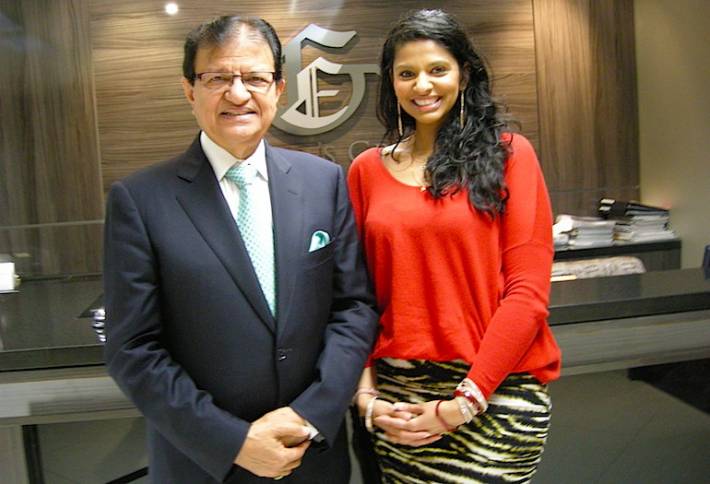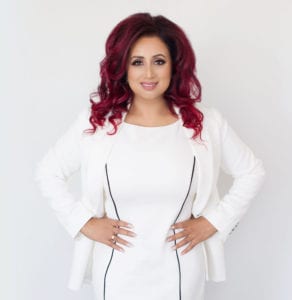Raj Girn: Hi, everyone, and welcome to ‘The Transform Your Confidence Show.’ This is a show about holistic leadership and advocacy, and I’m your host, Raj Girn.
chief strategy officer of the Rogue Insight Capital Ltd.. The Easton’s Group of Hotels has a diverse business portfolio spanning 20 hotels across Canada, with six in development. The Gupta Group focuses on the condominium market with a series of five residential and commercial developments across the greater Toronto area, whereas the Rogue Insight Capital Limited focuses on angel investments.
Reetu has many accolades under her belt that include making Canada’s 100 Most Powerful Women list for two years in a row. She has also been awarded the Excellence in Real Estate and Hospitality Award in 2019, and has made Canada’s Top 40 under 40 list in 2017. Here’s a deep dive into her perspective on leadership and effective communications as a woman in the hospitality, real estate and investment industries.
Here is our conversation:

Thank you so much for agreeing to be on the show today, Reetu. I’m so excited about diving deep with you about something that I think is an incredibly important conversation to be had, and one that I couldn’t imagine having without a sister like you who is extremely pro-equality and pro getting women up and out there and elevated. So thank you so much for agreeing to be on this show.
Reetu Gupta: Thank you so much for having me. Thank you for such beautiful and kind words. You are just a blessing and I’m so honoured to be here today.

“My goal with this show is to pull back the curtain. I mean way back, to bring you insider knowledge and resources on how today’s change makers are leading with intention and creating meaningful environments that serve everyone.” ~Raj Girn
So shall we just get right into it, my love? Let’s do it. I’d like to begin by asking you what leadership means to you, some sort of a definition that explains your specific belief system, based on your experience as a woman who leads companies in three male-dominated industries, namely hospitality, real estate and investing.
Absolutely. And that’s such a wonderful question. For me, leadership, being male or female, for me personally, the most important aspects of leadership and how I like to lead is with two things, and that is love and respect.
And those two things are so important. So for me, that would be how I define leadership. And if you’re asking me what is important to you, those are the two most important things to me.
And how does that work, Reetu, as a CEO of these three different companies that are in three different industries that are male dominated? Now, how well does bringing your female energy to a room work for you?
“I feel that every human deserves love and respect. It doesn’t matter if you’re a child, if you’re a mom, if you’re a teacher, if you’re working in housekeeping, if you’re working at the front desk at a hotel or if you’re in management, every human deserves love and respect. And for me, that is how I like to lead, with that energy, because for me it doesn’t matter if you’re a leader or follower, so to speak, for me everyone is human at the end of the day.” ~Reetu Gupta
It’s been so amazing. Because being female, naturally, people will say that we’re more empathetic. So I will speak on my behalf, I’m definitely more empathetic, very, very intuitive. And these are traits normally you associate with women.
So being in male-dominated industries, it’s been really interesting because at first I kind of thought, and I’m sure you can relate to this, that you kind of look at and say, “do I tell them that my feeling says we shouldn’t do that?” Because they’ll look at you like you’re crazy, like “what is this witch doing in our boardroom?” But I didn’t care about that. I just would say that my feeling says that we should go in a different direction. And a lot of men . . . and there was a male that used to work for us, a football player type who played football in high school. And he’d be like, “what is the feeling like? The numbers and this?” But after years of working with him, one day he came to me, he said, “I just have a feeling about this. I have a funny feeling and I don’t think that we should go ahead.” And I was just I was so happy to see that it really does. What’s the word? It absorbs into people when it’s right.
I think the right way of leading and the right way of leading life will absorb into people. And I can just see that now. I can see that people will now think about others first because I’m always like that. I will always put other people’s needs before mine. We do a lot of philanthropy in the company and one thing we do during the holidays is we’re always giving back. And what’s been amazing, I’ve done it for about 12 years, but I think the past two years all of the hotels will reach out to me and say, “Reetu what are we doing this year? What are we giving back?” We already have a plan. I love that. I love now they’re coming to me and saying, “Okay what is the next philanthropy campaign? When are we doing it?” So I hope that answers your question.
It really does, Reetu. And it’s interesting because it’s a very common theme that we’ve been having since I started this podcast. I’ve been talking to people about the fact that I’m a firm believer in and I advocate for holistic leadership and advocacy. That’s my thing, that’s what I believe in. And essentially what that means is that regardless of where you’re positioned in the ecosystem that you are a part of, especially as a leader, your job is to make everyone feel important and feel involved and feel that they are being heard.
“Regardless of where you’re positioned in the ecosystem that you are a part of, especially as a leader, your job is to make everyone feel important and feel involved and feel that they are being heard.” ~Raj Girn
And I know that in the real world, they call this diversity and inclusion, right? And it’s become kind of this big hip thing. But really, it’s something that, especially if you come from a background that has been really steeped in spirituality and different deep art and poetry and expression of some sort, this idea of holistic enterprise is really quite known to us. And what you’re talking about right now, those people who don’t know you the way I know you, I mean, you are a fierce warrior personality. And on the other side, you have this very gentle, sensitive side of you and everything in between. And sometimes you have to kind of go into your bag of goodies, those things that are essentially a part of who you are as an identity and bring different aspects of that to the table depending on what you’re dealing with. Again, this comes back to the whole idea of the 365-degree view from the top of the mountain, which is another theme that we’ve been talking about throughout this podcast, is just this idea that there’s not just one way to look at leadership.
And this is why off the top of every discussion I’ve had with incredible leaders, all from different industries, asking you what you feel and what you term and what you believe in to be leadership, to me, I feel, is the fundamental first point of discussion for me to set the stage of where you’re coming from as a leader. So thank you so much for that. It just begs so many other questions. Which means that obviously I have to bring you back on so we can kind of dive deeper into those areas.
Right now, we’re going to move right on because it kind of gets me thinking about a few other things that I feel are a great bounce off of starting the conversation this way. And it’s a two-part question. So the first part we do is why, in your opinion, is the idea of being able to communicate effectively down your food chain important?
Without communication, you have nothing. I feel that in the world if we had better communication it could solve humongous world problems. I think better communication could solve so many relationship problems. There is so much importance in communication. For me, when it comes to good leadership, you have to have good communication. And there are a lot of leaders that might from the top just talk but not communicate.
Right.
It’s two ways. You have to communicate, but you also have to listen. And I know that’s exactly what you mean when you’re saying how important is that? People think that if there’s giving direction, that’s communication. That’s not communication, anybody can do that.
“Anyone can give a list of orders to someone, but are you communicating? Are you listening? Are you putting together a plan and just putting it forward, or you putting together a plan and discussing it and saying: “Okay, what do you think about this? What should we do with this? What is your feeling about this?” That’s what’s most important to to me in communication. No business can be without it, in my opinion.” ~Reetu Gupta
Absolutely. And this just brings a whole other concept to the table and something that I hope people will really sit with and think about. I want this to be the takeaway from what you just said, Reetu. And, we just said off the top of her answer that, there are people who talk and there are people who communicate. I feel that this is something that you have to write down, guys, because it’s something we always forget in life. We know this because we do it also in our personal, intimate relationships with our friends and family. We do it all the time. We take it for granted that we get to be the way we want to be, and expect that what comes from other people needs to be the way that we expect it to be.
But we haven’t been doing effective communications, which, as Reetu just pointed out, is a two-way street. It’s another theme that I’ve been talking about throughout these various podcasts that we’ve had so far, so it’s just so fascinating to know everyone’s view from the top of the mountain, all the CEOs that I’ve brought on and leaders that I talk to in different industries are all saying the same thing — if you don’t have a two-way communication where a part of it is the talking part and the other part is the listening part, you’re actually not communicating effectively.
Talking is one way. Listening is also one way. Without them both, without the interaction, there actually isn’t a relationship that’s happening. That fits within my idea of what holistic leadership is, which clearly is something you believe in as well. So let me ask you the flip side of that, and that’s kind of part two of that question. If effective communications is missing, what have you seen within your organization in terms of the infrastructure that has all of a sudden become difficult to deal with? What would you say?
Yeah, yeah. So without swearing, there’s a really old movie, and I know Steven Seagal said this in the movie, because my sister and I used to love this line and he would say “assumption is the mother of all f…”
Right, right, right.
Without communication, you have assumptions being made and you have misinterpretation. And when you have those two things, its chaos. It’s not a good thing, because if you don’t have communication and you’re not being able to adequately express yourself and what needs to be done or what the ideas are that are being brought forth. If there’s no communication, and it is just one-way, then everybody is going to interpret it in a different way. And that’s human nature, which is fine. But you have to be careful about that, and I think those are the two major things that I’ve seen happen. But the major one is absolutely misinterpretation.
“If you don’t have a two-way communication where a part of it is the talking part and the other part is the listening part, you’re actually not communicating effectively.” ~Raj Girn
So how have you dealt with that? Say, for example, one of your leaders, in any of your three enterprises, you’ve seen that there is kind of a problem down the food chain in terms of communications, and then you kind of pinpoint, okay, this is the nucleus of where it is, this person. How have you dealt with that? Because that kind of conflict assessment and communication is difficult for a lot of people to handle. A lot of leaders are always challenged with this. How have you seen it to be the best way to deal with something like that?
Absolutely. I’ll give you the the flip version of that, because I am a leader and I am the CEO, although I don’t see myself at the top of the mountain because I think I’m still climbing my way up. And that’s life. I don’t want to be the top of the mountain yet. I want to still go up.
Your mountain keeps growing, darling.
Well, that’s so true. But I’ll give you an example, because I work with my parents, as you know. So working with my dad, there’s always situations where he’s “communicating” something to me and it is not being communicated the right way. So I’m in that position where the chairperson now thinks that he’s communicated something. But, in my opinion, this was not a communication at all. So, I can act out as a daughter and just freak out and throw tantrums and all of the that. Or I can pick up the phone and call the chairperson and say, “Okay, this is what you said, but what do you mean? And what would you actually like me to do? And why don’t we talk through this?”
That’s the best way to go about it. And I’ve seen it obviously with anyone else that I work with. If I think that there’s a miscommunication or a misunderstanding, I will always pick up the phone and say, “Okay, tell me what happened. Help me understand what’s happening here.” Because there’s always two sides to every story. It’s not that it’s not about right or wrong. It’s about what is right. It’s not about who is right. I think that people need to get rid of that notion and get rid of the ego and say, okay, business is always first. I don’t care who’s right and who’s wrong, business comes first. So that’s usually what I’ll do.
I have to do the same thing with my dad, put away the neglected child syndrome, and call and say “Okay, what is going on? How can we fix this?”
You know what I really am getting out of this, folks. I want to make sure that I share my feelings about what you just said, it is something that I think is incredibly important for us to understand. Because look here at the dynamic. On one side is a professional relationship, but this is also a personal relationship. And we all have different aspects of our life where there are different people in our lives, there’s nobody that doesn’t have this, where there is a crossover between the personal and professional arena.
And the thing that I found really, really poignant about what you just said that I really want people to . . . Again another point to write down, guys, don’t play a tennis match where you are batting back and forth with who is actually going to be the last one that gets to swing that bat. Let the ball fall, for want of an analogy, let the ball fall where it will. Readjust yourself. Pick up that ball and decide how you choose to bat it. So now you are not working from the energy of where that ball came from, but from the energy that you have decided best aligns with you.
“Don’t play a tennis match where you are batting back and forth with who is actually going to be the last one that gets to swing that bat. Let the ball fall, for want of an analogy, let the ball fall where it will. Readjust yourself. Pick up that ball and decide how you choose to bat it. So now you are not working from the energy of where that ball came from, but from the energy that you have decided best aligns with you.” ~Raj Girn
So that’s the thing that I want you guys to take away here. Very powerful, Reetu, what you just said there, because it’s even more difficult to accomplish when you have multiple relationships with said individual. It’s a lot easier if it’s just purely a professional arrangement because there’s no emotional attachment, there’s no historical psychological attachment. It’s literally like a mathematical equation.
Which is also very interesting because, in mathematics, you can — even though there’s only ever one right answer — someone like me who’s not good at math will interpret math in a different way than a lot of other people. An example of this is 1 + 1 = 2 in mathematics. But in my head, 1 + 1 = 11, because I look at things in a different way because I’m an entrepreneur. So my vision, the telescope through which my lens of my vision is extremely expansive, and that’s like a whole other show which I’m bringing you back on for that one, because that one, I think we need.
So this brings me to wanting to maybe go a little bit into the industries that you work in that’s jumped to that kind of part of our conversation.
The first thing I want to ask you is can you share some insights on what your shift in strategy has been post the current climate that we’re having economically? So post pandemic versus the pandemic environment that we’re all in, especially as it’s related to the incorporation of morale within your team. And I want to give this question to you, because being that you’re in the hospitality industry there are a couple of things you face. One is you have expansive amounts of teams that everyone relies on. There’s a food chain that everyone relies on. Which is very different from maybe an online entrepreneur, for example, where you can be a solopreneur, you could maybe have a couple of other people you’re working with and that, too, in a virtual environment. So that’s one piece. The other piece is that they’re all dispersed in a lot of different geographical areas in the hospitality industry, especially in your ecosystem, like multiple hotels and multiple geographical locations, multiple mini infrastructures down each of the hotels’ food chain. So bearing that in mind, based on the current climate, thinking about what the situation was like, pre-pandemic to where we are right now. How have you communicated with your teams, number one, to keep the morale going? Number two, to stay connected?
Great question. Just to give you a little bit of background of the way that our business works. We have a head office and we’ve had the same office for 20 years. So super antiquated people working on desktops in the back office —really, really old school. So the pandemic hit last March. And now, although we are a central business, I wanted everyone to have the ability to work from home. So within 24 hours, we got laptops, figured out how the hell to move desktops. We have nothing on the cloud, so everything had to change.

But we wanted to make sure that we gave people that opportunity to be able to work from home in terms of being in communication. Everybody was on Microsoft Teams that way. If they needed to be in touch, the world is virtual now. So whether they’re using Teams or go to Zoom, that’s how people we’re staying in touch.
But your question is amazing in terms of morale, because naturally, with hotel occupancies being so low, sometimes there are days where there’s one guest. There are days where there are no guests in the hotel and we made the choice to keep our hotels open. And the reason why, is although we’re losing money, I didn’t want to lose jobs. And I wanted to make sure that our people, even if I could just keep two more people in the hotel, that’s what I wanted to do. And I wanted our company to understand and to know that we’re with you, we’re open, and we are going to do whatever we can. As soon as things get better, we’re going to make sure that the doors are open and staffing is back to one hundred percent.
Wow, that is difficult to accomplish what you just said. This is another thing that’s coming to me based on what you just said. You have got to be really courageous to be a really effective leader and make those decisions that put you kind of in the crossroads between what’s good for the company versu what’s good for the people that are a part of that company. And that’s got to be the single most difficult thing to do today in the hospitality industry. But you made a decision.
It is, yes. And it was a difficult one at that because of the fact that we were obviously losing money because of it. But for me, I’m looking at it as if I take care of our people now, once we open and we’re at one hundred percent, they’re going to take care of me. So I don’t want them to lose their work. So when people are not working, I felt like it was the least I could do. Also as soon as the pandemic hit, it was February, March, I’m looking at all of our hotels and all I could feel was that as much as we’re in a really difficult place, there are so many more people that are worse off than us. And I felt that I need all of our company to know, to understand that you have jobs, you’ve something to come back to.
But there are other people that don’t even have food on the table. So launched Project Kindness. And it was a challenge to all the hotels to say, okay, there are people that are worse off than us and I want you to remember that. And now it’s our duty to give back. So within 24 hours, I launched Project: Kindness. We were able to get 1870 pounds of food donated to Second Harvest. As we’re winding down, I asked them, I said, “if you have food that you can donate, do not throw it away. Let’s donate it.” And everyone was so loving and caring and all of the general managers, they jumped on board and said, “absolutely, let’s help others.” And that was another way for me to sort of spark that morale, to show people that we’re still blessed where we live in this country. It’s now our duty to give back. Smaller things I would do.
I would also do sort of email memos, and I would always include something cute, something motivating, and just keep everyone in the loop to say, “Okay, this is what’s going on right now. This is the current situation. This is what we’re planning to do.” Just so everyone feels included. And another thing that we did, which was Easter last year, we did for all of the staff, we made little takeaway meals for Easter weekend. So we did family-sized meals of pasta and something meat and vegan, that we asked all of our staff “if you’re comfortable to come in, come in. And we have this meal for you and for your family for the Easter weekend.” Just so they also know that we’re here, we’re with you. We understand this is a difficult time. So those are small things, but I hope that it would go a long way.
You know what I’m hearing here, folks, two things really jumped out at me that I want to share. One thing is that Reetu is the kind of leader that is a forward-thinking leader. She’s thinking of the bigger picture. So this is something that you really have to think about out. And it’s not easy to do. And I appreciate that. And I’m going to start by saying that I understand that there are lots of industries, lots of circumstances of businesses that just simply can’t do that. But if you’re in a position where even remotely this is a possibility for you, where you can think about the bigger picture (and the bigger picture includes the entire ecosystem of your staff network, your team network), to be able to keep some semblance of normalcy in terms of the people that you can keep some on. Obviously, you’re not going to be able to keep some of them on. But even if, just one or two of them, you can keep on just to kind of keep that understanding that as a leader, that your livelihood is important to me.
I mean, that’s a very, very strong statement that you made down your food chain, too. And the other thing that I picked up on what you said is the connectivity piece, right? Like how you have these different ways to remind people that you’re thinking of them. You’re reminding your team that you’re thinking of them, reminding them that they still are better off than a lot of people out there. So let’s donate, let’s participate in that particular give-back component. I really hope, guys, that you are listening to this carefully, because oftentimes, again, this is about effective communication. Effective listening is important because there are so many wonderful caveats of wisdom and interesting tips that you can take away from conversations like this.
And that’s my goal with this show, guys, is to bring on people who have a lot of experience in different wheelhouses that sit at the top of some sort of food chain, who have a lot to lose in a lot of circumstances when they’re dealing with challenges. The more you gain, puts you in a position that you have more to lose. So communications and leadership become even more valuable, even more important. Thank you for that, Reetu. People that work in your environment, the culture that you have, they must just absolutely love working with you and working with this idea that the leader actually cares about what happens to them and cares about the community around them. Just love, love hearing stories like this. Thank you so much for sharing that. Absolutely.
So let’s move on. Let’s get right into the next question that I have for you. Do you communicate differently with your team members versus your clients, for example? And if you do, can you share some tips on how to create advocacy within your team culture versus your client base? I mean, is there even a difference? And if there is, what is it?

Such an interesting question, because I feel like most humans have different sides to themselves. So they are one person with their friends, one person with their parents, one person at work. But I think for me, I don’t do that. And I don’t have a different side. And anyone that knows me will see all sides of me. For me, this is important because I want someone to see who I am at work. And I mean also I’m blessed that I work in the family. So no matter what, if you’re in a room with me and and my dad, you’re seeing our interaction. You’re also seeing how we deal with business. So for me, I think first and foremost, a relationship is the most important. And whatever you have to do to make sure that your relationship, especially with your clients or whatever it is that’s bringing you the revenues that are allowing you to live, you have to give that relationship life. If you feel that you’re you’re most authentic self and that’s what you have to do. If you feel that you should be a little more polished, that’s personal choice.
“Polished or not, professional or not, I am the same person with my family, with my friends. You know this the most. With clients I am always the same person.” ~Reetu Gupta
I love it and it’s interesting because everyone has a different way of looking at how their relationship could potentially be the same or different, they have different reasons for it. I always love it when I’m speaking to a leader who is who they are, whether they’re talking to the person that is vacuuming the washrooms in one of the hotels, for example, or someone that is bringing in revenue and is a decision-maker and being able to bring in massive conferences of people. And I’ve seen this guys, with Reetu. I mean, it really doesn’t matter who you are, you’re going to get the best of her or the worst of it, if she happens to be on her period.
Don’t get me on a bad day. And don’t piss me off. I’m a really cool person until you piss me off.
No, I get it. But at least people know, right? Black and white. They know what they’re getting. And that’s that’s also another really important piece of our communications guys, is don’t be ambiguous with who you are as an identity, good, bad or ugly.
A lot of people don’t pick up on what’s actually been the precursor to the conversation piece that they’ve walked into. There are so many different things that we can talk about, which, of course, we will on another show, because I have many other questions for Reetu and I want to just dive back in there.
So, Reetu, hospitality is a brick-and-mortar industry and I haven’t yet really talked to anyone that is brick and mortar on the show. And I feel this is really important because brick and mortar is the single most affected industry globally right now. So I want to go there and I can’t think of anyone better to talk to than someone who all three enterprises are that. So hospitality, again, is a brick and mortar industry. So unlike many others that can pivot online very, very quickly, very, very effectively with minimal disruption, that’s not the case here.
And I want to talk to you about this, because there are so many entrepreneurs suffering in so many industries where they rely on their physical place of business to make their living. I mean, places like restaurants and bars, cafes, gyms, beauty parlors, hair salons. I mean, this is just a few, the list goes on and on and on. Can you share any strategies from your experience at this very time that you have implemented that has helped you on some level? Now, obviously, it can’t help you on the full impact level because of the industry you’re in, but on some level to stay above, to stay solvent.
Absolutely. So we saw this pandemic sort of start in December of 2019. That’s when we first started to see it rearing its head. In fact, it is when we started realizing that this is coming to Canada and we’re going to have an issue. So at that point, knowing, and for me, feeling that this is going to be a hugely global pandemic, I challenged all of our hotels to say, okay, it is very likely that if we get business from overseas or from the US, that’s going to stop. So we now need to look at changing our strategy and look at our business. We can look at business that we can get domestically.” And that really changed.
That focus allowed us to stay open, honestly, because then we were able to look at other businesses. So we did that in the beginning, which helped us get through sort of the first time. And then another thing we did was we looked at what other businesses are essential. So there were certain constructions that were essential. Obviously, health care was essential. So how can we help them as well? What can we do? What can we offer them? What can we provide them in order to help them? Is it meeting rooms? Is it a guest room? How else can we look at it? So I think for us it’s more so than any business you have to be creative.
And it’s so cliche to say “think outside the box,” but it’s more so creative if you’re looking at where you can get your business from. It doesn’t have to be the typical ABC. That’s what we started doing. One thing that was so interesting that one of our hotels did by the airport. So obviously as people come into Canada, they have to isolate. So what they did through social media is they contacted different airlines, and in this case it was Air India. They contacted Air India and said if you have people coming in, stay with us for the 14 days for your isolation, we will take care of you. They added in three meals a day that was obviously delivered, sanitized, no touch, no human contact. Three meals a day to the guests that came in from Air India that resulted in 14 days, and it was just those small things being created, being unique, trying to think of where else can we get business. There were a lot of people that were having to go back to the country. Before that, they had to isolate. So this was what those were sort of those little niche segments that we were trying to target in order, as you said, to stay solvent.
“Be clear on who you are and what you believe in and and how you do things, because you can’t assume that a person will get that with all the non-subliminal kind of messaging that is 80 percent of the communications that we do. A lot of people don’t pick up on energy when they walk in the room.” ~Raj Girn
Right. I have to say one more thing that I would add to your list, and that is being resourceful. What I’m hearing you say is that you have to think outside of your normal box of clients, a normal way that people come to you. Predominantly, it is business like a business and leisure, right. And now you’re looking at a different problem or challenge, rather, that we’re facing where we need housing. So really, that’s kind of what I’m hearing you say. So being resourceful, thinking outside of the box and looking at how do you still do what you do, which is house people and feed them.
Absolutely. And honestly, you said it best. You said 1 + 1 = 11. That’s how you have to think. I just look at that. There isn’t only one solution. You have to be creative.
Absolutely. The other part of your business portfolio is real estate and also investments. What tips can you share with our audience about the market opportunity right now? Because in a down economy, many people with the fortitude to invest come out winners if they know, in fact, what they’re supposed to be doing. What would you say from your experience, in kind of what’s been going on in those portfolios for you, that you could perhaps share with people out there that maybe have a little bit of money and don’t really know what to do?
They are holding on to it because we get this kind of scarcity mindset. If I let go of this money, then where am I going to get money from where in fact, big business opportunity comes from giving away that money, to be able to think about kind of the bigger picture down the road. Now, I know this is a mind shift thing. What are your thoughts? I’m not going to put words in your mouth. What would you say in in those circumstances?
Absolutely. So I can tell you a little bit about the investing world. Rouge Insight Capital is the company that my brother and I have co-founded. He’s the President, CEO and he is immensely intelligent. So what I would suggest to people that are looking to invest, it depends on are they looking to invest in markets or are they looking to invest in startups? Exactly as you said, two completely different mindsets. So I would say 100 per cent you should go down the road, speak to your professional, speak to people that know what they’re talking about, because everyone kind of likes to tout themselves as real investors. But I think it’s really important that you get the right knowledge.

My brother has amazing investment advice that you can follow as well. And he has amazing investment advice when it comes to startups. For us, primarily what we look at is that we look at female-led businesses, as well as minority businesses. So for us, it’s not necessarily “OK, well, this company is going to win money.” It’s more so this woman has an amazing idea and she needs access to funds and that’s how we’re going to help her. So that is something that we also did during the pandemic. And through Rouge, we did invest in real estate. And because there was a downturn in the beginning of the pandemic, now as companies are selling off, we’re starting to see the uptick, which has been amazing. So definitely I would suggest if people are interested to invest, definitely go down that road. I know sometimes it’s scary, especially in a time like this, to let go of funds that you have saved. But if you speak to professionals who can help you through it, it is definitely a great way to make even more money on your savings.
So let me ask you this off the back of what you just said there, Reetu. So how, if somebody has some money that they want to invest, but they don’t invest as they don’t have that I.Q., how do they get a hold of your brother in order to see if there are opportunities that they can invest in?
One hundred per cent, I would say follow him on Instagram. His handle is @surajkgupta. Send him a DM, and if you have any questions, he’ll be happy to help kind of just point you in the right direction.
And then the second question I want to ask you off the back of what you just said is you said that you look at female and minority opportunities. Can you give us some ideas just in case anyone out there is listening or watching this? What industries potentially do you look at, number one? And number two, what series level do you invest?
So we’re actually industry agnostic. We look at everything. So we have investments in AI, real estate, in fintech. We really look at the idea and the value of the team. That is first and foremost, what is the most important.
Now, the second part of that is at what level? What series level are you investing in?
We look at a seed, but we typically like series A. So between seed and series A.
OK. Got it. Perfect. So you heard it right here, folks. So if people were to want to pitch their ideas that fit within what you just mentioned. How do they do that with you guys?
They can reach out to us. So you have my brothers. My Instagram is @sis_from_the_six. Send me a DM, We would love to be in touch and hear your ideas.
People looking for investments, or having any questions regarding investments can reach out to Reetu Gupta on Instagram @sis_from_the_six, and her brother Suraj K. Gupta @surajkgupta.
We’re going to make sure that we share this, just that that people out there, who are listening at least have a point of contact to then know where to move forward with their journey in investing. So let me ask you this then, what advice do you have? A question I know that you know, I’m going to ask, but I can’t think of someone better to ask this question to so far. What advice do you have for other women for reaching into male dominated industries? Like what do you need to know to better position yourselves, especially since you have the expertise on that? Expertise speaks louder than gender, because unfortunately, we still live in a time when gender is still speaking louder than expertise even though that’s changing.
Absolutely. I think that all women, for me, they need to carry three things with them. From my personal experience, I carry these three things with me and I feel like it’s made me who I am today. And those three things are three Cs. It’s courage, conviction and confidence. For me you have to have the courage to believe in yourself and to believe in all of your dreams, have the confidence to be absolutely yourself and to be able to list 10 amazing traits about you, and go through your day with that energy and conviction. Whatever you put your mind to, whatever dreams you have, whatever goals you have, go down that road with absolute conviction. And I feel very strongly that if you carry these three things with you, you cannot fail.
I love it. Oh, my God. Thanks! Guys, I hope you guys are going to stop right here, rewind this and write this down. Another very interesting way to look at what you think about yourself. And I think that’s what you’re saying here, Reetu, like stay connected with your opinion and interpretation and perspective on who you are for you, because that will ride every single tide that you’re going to face, right?
One hundred per cent. I feel, as a woman, there are all of these stereotypes and stigmas. Maybe we’re too emotional or, as you said, “she could be mad when she’s on her period.” Again, it’s another stereotype, right? No, we’re fabulous no matter what. Maybe we have good days, maybe we have bad days, but I think you have to be able to be aware of yourself and aware of all of the positivity. That’s great about you. And it’s so easy to start believing all of these things people say about women leaders. And I think it’s up to us, as women, to stand together to say, “okay, I’m fearless and I’m fabulous.” And if I have the certain job, I am amazing at X, Y and Z. And if you’re amazing at it and you believe you are amazing at it, other people will start to believe that too.
“All women need to carry three things with them, and those three things are three Cs: Courage, conviction and confidence. You have to have the courage to believe in yourself and to believe in all of your dreams, have the confidence to be absolutely yourself and to be able to list 10 amazing traits about you and go through your day with that energy and conviction.” ~Reetu Gupta
Absolutely. And we see the shift and the change in tide right now. I mean, we have a South Asian Black vice president of the United States of America. I mean, a market that we’ve all known, we’ve all known is a very gender-biased country. It’s a country that also has a lot of under the belly belief that if you are of a certain culture, that you’re not as good or as superior or whatever those words are that you want to use. They’re not even coming to me because I don’t believe in them. You know, it’s a country that we know has this in its underbelly.
And we know that someone like her sitting at the helm is going to be faced every step of the way with challenges from all the people around for being in this kind of very unique white male-dominated — if there’s ever a white male-dominated place to be, that’s American politics as much as that’s changing. Look at the history and the trajectory of who have been the top two people in that corporation — the presidents and the vice presidents. We have very rarely seen anything like this. In fact, we’ve never seen anything like this when it comes to women and when it comes to women of colour.
So what I’m taking away from what you just said there, Reetu, is no matter what comes your way, if you are as steadfast as Kamala is, as Reetu is, as I am and who you are, what you represent, what your core value system is, and that you stay aligned with your actions being within that wheelhouse, no matter what storm comes your way, you will weather it. You’ll weather it because you are staying true to the core value system, a nucleus of what makes you who you are. And that’s all you can do as a human is to stay there. That’s your job. That’s what you’re here to do. You cannot think about the effects of the external environment. That can’t be controlled by you, and I think that’s the other thing that we have to look at.
Now, there are certain things in the environment, of course, we’re all affected by. And even that’s another way to communicate with yourself. How are you looking at the situation or the circumstance that you’re in? What is that narrative that you are buying into, that you tell yourself? Because I’m a firm believer that the narrative that you believe is always the one that you’re envisaging for yourself. And it really is not as much predicated on the outside world. And I know that a lot of you will rush to disagree with me, but I want you to sit with that thought for a moment, right. Like, really, what is it that you actually end up buying into? Is your belief system, your idea of who you think you are.
Absolutely.
Absolutely. So for anyone out there who doesn’t buy into the importance of effective communications being mandatory in leadership roles, what would you say to them so that they can take the time to create an effective strategy to dial into their own respective ecosystem, be it at work or be at home?
“If they say that communication is not important, I would say you are not a leader. Get out of the role, do something else because you cannot be a leader and not believe in communication. They do not go hand in hand.” ~Reetu Gupta
And if, on a serious side, if this person or if someone doesn’t understand the effective impact of communication, I would challenge them to say, “Okay, look at your personal life and look at issues that you’ve had with people and think about the fact if this person had heard you out or if there was better communication, what would have happened with that issue?” Because communication is everywhere. This is not just in business and it is important in every aspect of life. But a good leader cannot say that communication is not important.
Yeah, absolutely. Here here to that, sweetheart. And finally, my my last question for you is, what have you learned to be the top three tips you can share with aspiring entrepreneurs or aspiring corporates going up the ladder in being able to lead with the perfect balance of authority, integrity and empathy?
Top three tips. It’s funny because I feel like you gave the tips in your question. Honestly, those three things are actually the most the important thing. I think one theme that you’ve constantly brought up in in our talk today is being authentic to your true self. And I think especially as women, we need to be. I wish more women would be more aware of who they are and exactly as you just said, not get sucked into that narrative of what other people are seeing. But because I think that all of us, men and women, kind of fall into that trap. And I think in order to be an effective, not even an effective leader, doing this is not being a good person. As long you are confident with who you are, confident with what your morals, your traits, your good things, your bad things — as long as you’re confident about that and you’re authentic about that, that to me is the most important thing.
I think that first and foremost, you have to be honest with yourself, with who you are, and honest with others, as well as having love first and foremost for yourself. I talked about love and respect in the beginning. And as a leader, it’s so important to do that. However, first and foremost, you also need to have love and respect for yourself.
Thank you so much, Reetu. And what an insightful, deep conversation that we just finished having. It’s very, very normal for you and me to have these conversations. And as you know I feel that all of our viewers, our listeners, our audience have a lot of kind of caveats that they can adopt and adapt and put into their lives.
“Communications is an inward out process until you understand who you are or what your identity is, or what your narrative is and how you’re communicating that to the world.” ~Raj Girn
And I’m so happy when people are able to be privy to just how much they can take away from a conversation like this. Folks, you heard it right here. This was a conversation that is an incredibly important one to have, not just as a leader, but also, as somebody that is leading an enterprise that perhaps right now is very, very difficult to navigate through, especially if you’re a brick and mortar. But also important for you to remember that communications is an inward out process until you understand who you are or what your identity is, or what your narrative is and how you’re communicating that to the world.
The second part of that is then when you start going out to communicate with loved ones, people that you work with, et cetera. So I want to leave you guys with that. And thank you so much, Reetu, again. And you and I are going to have another conversation because I feel like we need to go even deeper than this particular conversation.
One hundred per cent. Thank you so much for having me. And most importantly, thank you for doing what you’re doing. I don’t think people realize. I’m just looking at everything you’ve created for other people. You just wake up and you do this. But, I know how much heart and soul you put into this entire project. And God bless you for doing this, because this transformation academy, the confidence academy, it’s amazing. God bless. And thank you so much for doing this.
Thank you so much, Reetu. I love you.
I love you so much.
Thank you so much for staying till the end. Guys, I really hope you enjoyed the show and will action the many insights that we shared. I always say knowledge without action doesn’t change a thing. And I really believe that because I’ve seen time and time again over my entrepreneurial years how truly invaluable that formula is. If there’s only one takeaway that you have from my show each and every week, I want it to be this. In order to create a bulletproof strategy, you must marry knowledge with action and accountability. Without these working together, when you hit an uphill battle, as many companies and home environments do, the challenge that is much greater is the one that is there a net to catch you when you fall?
“In order to create a bulletproof strategy, you must marry knowledge with action and accountability.” ~Raj Girn
A strong leadership with an advocacy mission is that net. Before you leave, I would love your support by subscribing to the podcast on your Apple and Android platforms. I would also love for you to support me by subscribing to The Open Chest Confidence Academy on YouTube. And please, if you feel that this show is of benefit to anyone in your ecosystem, please invite them to listen and subscribe also. I sincerely appreciate your support. And each and every week I hope you’ll keep coming back and keep sharing in the comments what you liked and what you’d like to see more of. Until next week, have a great rest of your week.
To Contact Reetu Gupta: Instagram @sis_from_the_six












